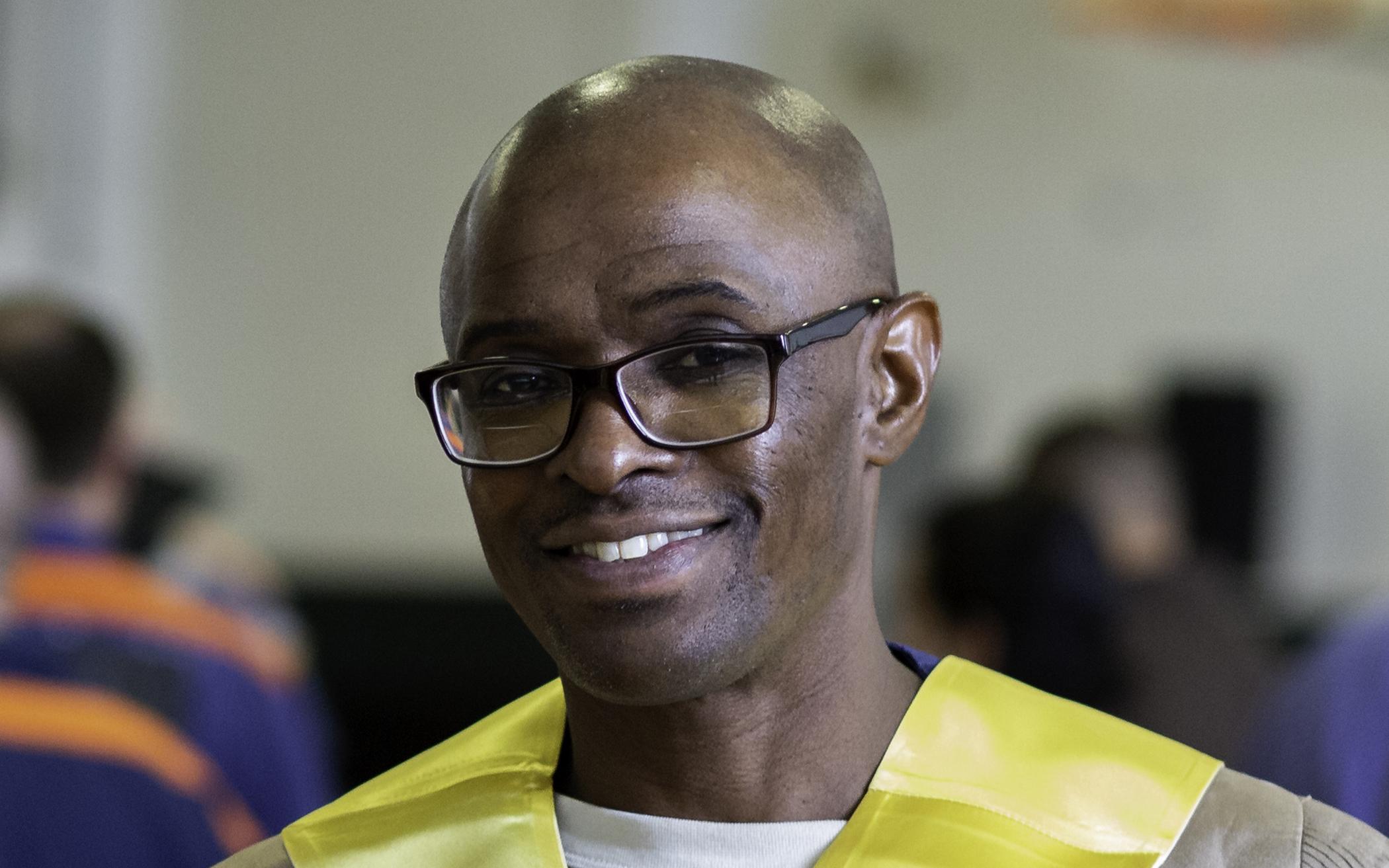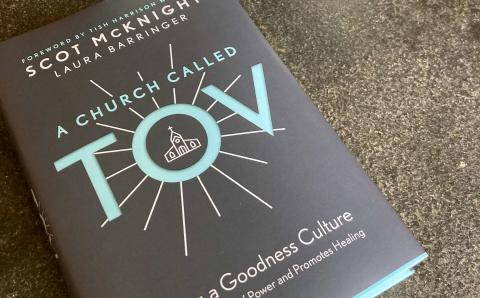“I never thought I’d be here today,” said Patrick Campbell. “I consider myself the least of the least.”
The last time Campbell’s name was published publicly, it was in reference to his worst mistake—one that would cost him his freedom.
“I was separated from my feelings and emotions because of my drug use,” Campbell recalled about that time of his life. “I felt like nobody really loved me; my emotional security was off.”
Hitting Rock Bottom
With no father figure, little money, and no roadmap for life, Campbell turned to the streets, doing drugs as a way of socializing. “I thought this was the best life had to offer,” he said.
But one night in 1997 while he was high, he hit an ultimate low. At age 28, he was headed to prison for second-degree murder. That destructive decision, which he continues to deeply regret, changed his life. Now, at age 54, he’s still behind bars.
Over the past 26 years, his scenery hasn’t changed much: he’s surrounded by barbed-wire fencing and is confined most of the time to a 5-by-8-foot cell. His wardrobe consists of blue pants and a blue shirt with a number on the back.
A Call to Christ
But his outlook on life couldn’t be more different from what it was in 1997. The reason can be boiled down to two big decisions.
The first came shortly after his arrest. He was in Kent County (Mich.) Jail, and a chaplain was ministering to him. Campbell said the chaplain explained John 15 to him, and Campbell gave his life to Christ. He remembers being told at that moment that he’d have great opportunities to bless a lot of people.
That first big decision set him up for the second. But this one took some convincing.
From Comfort to Calling
Campbell had gotten comfortable at the Earnest C. Brooks Correctional Facility in Muskegon, Mich. Yes, it was a prison, but his setup was pretty good. He had a kitchen job that he liked and had just graduated from the Urban Ministry Institute, an initiative of Prison Fellowship Ministries.
In 2015, he heard about the Calvin Prison Initiative (CPI), a first-of-its-kind program in the state offered by Calvin University and Calvin Theological Seminary that would offer a bachelor’s degree to inmates.
“I thought that the workload was going to be heavy; I wasn’t sure I could keep up with it,” Campbell recalled. While he had some education under his belt, he had arrived in prison at just a fifth-grade reading level and had poor communication and writing skills.
Not only that, but if he were to take on this opportunity, it would mean transferring from Brooks to Handlon Correctional Facility in Ionia, Mich.
“This (Handlon) prison was called ‘gladiator school,’” said Campbell—“people getting hurt, people getting stitches, sometimes emergency situations.”
It was more dangerous than Brooks, and the living quarters were smaller. Campbell struggled to see this as an opportunity.
“I gotta think about it,” Campbell remembered telling Raymond, one of his peers at Brooks. “He asked me, ‘What’s to think about?’ I told him, ‘I got to talk to my mother.’ He said, ‘There’s nothing to think about.’”
So Campbell and Raymond applied and were accepted. In fact, five inmates from Brooks would be transferred, joining 15 others from facilities across the state to form CPI’s first cohort.
Forming a New Community
From the beginning, Campbell felt supported by his new peers.
“Dustin was teaching me English; Shawn and Nick were teaching me study skills; Grady was teaching me a lot of stuff. There’s a lot of great people just in that first cohort. I’m glad I got to journey with those guys. Those guys poured a lot into me. It’s like I’m coming into this room where I felt cared for.”
His peers poured into him, and his professors helped lay a foundation for the road ahead, helping Campbell and his classmates develop the study skills and the framework they needed through classes like Developing a Christian Mind.
“I can’t forget the professors. Many of them took time out of their schedule to help. Some are still a big part of my life today,” Campbell said. “That first semester was probably my greatest semester because it gave me that hope and will to say I can make it through this, I can make it through another one (semester) and another one.”
A Momentous Achievement
Ten semesters later, on May 22, 2021, Campbell graduated from Calvin University with a Bachelor’s in Faith and Community Leadership. His name was read and his photo shown on the big screen at a commencement ceremony at LMCU Ballpark.
“This is a great program and is probably one of the best programs out there,” said Campbell. “You should have this kind of training behind bars because education shapes lives, and it gives everyone a new mindset to think critically, especially in the days we are living in right now.”
“By God’s grace, the support of the CPI community, and hard work, Patrick defied all odds,” said Todd Cioffi, director of CPI and professor of congregational and ministry studies at Calvin. “Without a doubt, Patrick embodies the mission of CPI.”
A Calling Without Constraints
Campbell’s life sentence has the opportunity for parole in the future, but his calling isn’t limited by his surroundings. Whether he remains at Handlon, gets transferred to another correctional facility, or gets released, he’s equipped to be Christ’s agent of renewal.
“When we came into prison, people always told us, ‘You got no hope,’ and that’s how I looked at it before I got this education. It was hopeless,” said Campbell. “This education has equipped me so I can take the hope I have (because of the gospel), and bring it to the next person and to the next person and on down the road.”
“Patrick’s story is not unique,” said Gary Burge, dean of the faculty for Calvin Theological Seminary. “Having taught in the CPI program for four years, I have met numerous men whose lives have followed a parallel path. Education is about transformation as well as about equipping. We give students knowledge to equip them for the world they will enter and serve. But we also teach to transform. And no place is this transformation more dramatic than what we see at Handlon Prison.”
“Nothing happens without prayer. It all happens through the Holy Spirit,” Campbell said. “Liberation means we take the gospel everywhere with (all) people, everywhere we go, and none of God’s plans happen without action.”
Bold Steps of Obedience
It took bold steps from Campbell and his cohort to be in the vanguard of this new program. It also took bold steps from Calvin University, Calvin Theological Seminary, and the Michigan Department of Corrections.
“I never envisioned myself where I am right now,” Campbell said. “I think that leading does that: it causes you to go into places you are uncomfortable. I think that’s what the Good Samaritan story is too: it causes you to go to places you wouldn’t often go.”
“To say that we had no idea what we were getting into when we started CPI is an understatement,” Cioffi said. “All we knew was that God was calling us to go behind bars. We went, God was abundantly faithful, and now Patrick is fulfilling his calling. God is good.”
By going to those places, change happens. People’s lives are transformed, and prison culture is reformed.
“Twenty-eight years ago, people would have said I was a mess, that I didn’t know what direction I was going,” said Campbell. “Today, people everywhere are coming around me from all walks of life. Everyone wants to talk to me, everyone wants to hear what I have to say. I’m full of love and encouragement, a brother they love that has compassion. I want to be part of their life; back then I was around people just because it involved my habit of choice.
“This program transformed my life, it shaped and formed me into a person who really thinks critically about making good decisions and how I can help someone take that same path.”
About the Author
Matt Kucinski is media relations manager at Calvin University.








